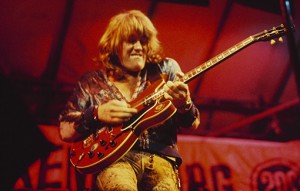When you think of British guitarist Alvin Lee, who died Wednesday morning at age 68, you probably think of that twelve-minute version of “I’m Goin’ Home” in the Woodstock movie—a performance full of hyperspeed guitar and sexual innuendo, one that won him a thousand groupies and sealed his reputation as “Captain Speedfingers.” If that’s all there was to Lee’s career, we probably wouldn’t be discussing it here. But there was a good deal more.
Lee’s band, Ten Years After, came in on the British blues wave that brought us Cream, Led Zeppelin, the original Fleetwood Mac and the Yardbirds. Like those bands, Ten Years After were raw onstage and experimental in the studio, and TYA’s studio albums were more psychedelicized than most. Sure, some of it’s dated—especially the lyrics, which were never his strong suit—but a track like “No Title,” from Stonedhenge, showed how imaginative blues-rock could get. The eight-minute song’s structure—beginning as near silence, with instruments being added until it turns to a harsh electronic wail—isn’t far from the studio art that the likes of Brian Eno would popularize later on. (That track isn’t on the web, but here’s the album’s finale “Speed Kills,” and listen through to its surprise ending).
Lee always had mixed feelings about the guitar hero image, still willing to play “I’m Goin’ Home” but wanting to honor his influences. And most of those came from the American South: His first album outside Ten Years After, On the Road to Freedom, was a duo set with Mississippi cult figure (and eventual Christian artist) Mylon LeFevre, steeped in Southern rock and gospel. And in 2003 he recruited two members of Elvis Presley’s band, guitarist Scotty Moore and drummer D.J. Fontana, to record one of his better latter-day discs, Alvin Lee in Tennessee. “I’m Goin’ Home” was here again, this time as a shuffle with fewer notes and a real groove. “I never liked the thought of being an entertainer,” he told me during a late-‘80s interview. “I call myself a musician.”
Like many musicians at the time, he also gravitated to New Orleans. His 1974 live album In Flight included a couple of Little Richard and Larry Williams nuggets. More surprising was its tasteful version of Allen Toussaint’s “Freedom For the Stallion,” done as an instrumental featuring Mel Collins’ sax. That tune has become one of Toussaint’s most enduring: He cut the original with Lee Dorsey as a 1971 single, Three Dog Night picked up on it soon after, the Hues Corporation had a minor hit with it in ’73, and Elvis Costello revived it with Toussaint on The River in Reverse. Lee’s cover got lost in the shuffle, but it’s one of the nicer ones.
It’s no secret that a lot of ‘70s kids got their first taste of the blues from the British crew, and then went back to the sources. And the echoes of the British blues movement are still with us today—for evidence, just wait for Fleetwood Mac’s set at Jazz Fest, and enjoy all the geezers insisting how much better the Mac were when they were still a blues band.
–Brett Milano





